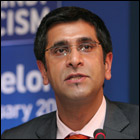
Piara Powar, Director of 'Kick It Out' (United Kingdom)
5 March 2009
1.Describe the work of the 'Kick It Out' campaign?
Kick It Out is football's equality and inclusion campaign. The brand name of the campaign - Let ' s Kick Racism Out of Football - was established in 1993 and Kick It Out established as a body in 1997. Kick It Out works throughout the football, educational and community sectors to challenge discrimination, encourage inclusive practices and work for positive change.
2. How has the campaign been received by UK football authorities?
The campaign is supported and funded by the game's governing bodies, including founding body the Professional Footballers Association (PFA), the FA Premier League, the Football Foundation and The Football Association.
3. What successes would you claim for the campaign in the fight against racism and discrimination in the United Kingdom?
Since Kick It Out’s inception, there have been a number of milestones and breakthroughs in various areas of our work. Recently, the Premier League saw its first ever black British manager, whilst there are now several British Asian players playing professional football in England. Kick It Out has also worked closely with a number of community groups, and has contributed to the success of many new groups through various funding opportunities.
4. What challenges does the campaign face in fighting discrimination in UK football?
There are a number of challenges currently facing the organisation, including growing concerns over homophobia in the sport, the small number of British Asians participating in the game at all levels and the lack of Roma.
5. How do you assess the current level of discrimination in the United Kingdom?
Discrimination in the UK as a whole has undoubtedly been reduced when compared to previous decades, but is by no means eradicated and it continues to exist in many different forms. The way that the UK press reports on issues relating to asylum seekers and foreign workers is proof that there are still areas of concern, whilst homophobia remains an accepted form of discrimination in many areas of UK life.
6. How would you assess the national acceptance of cultural diversity in the UK?
There are many reasons for optimism and there are areas across the country where a vast number of different cultures co-exist, but there remain areas where acceptance levels are not as they should be.
7. How have other cultural and sports organisations and political groups responded to the challenges of diversity in the United Kingdom?
Various cultural and sporting organisations have worked closely with Kick It Out to meet the challenges of diversity. Kick It Out has also teamed up with politicians from groups such as the All Party Parliamentary Football Group for events on issues of diversity.
8. In your view, what specific measures still need to be taken at the national level to fight discrimination in football and in sport in general?
With regards to specific measures, the main issue for Kick It Out would be to encourage professional clubs to make all supporters aware of the existing avenues available for reporting discrimination. There must also be a greater focus on educating people as to the various areas of discrimination.
9. What contribution can the experience of the ‘Kick It Out' campaign make to the debate over racism in sport at the European level?
As part of the Football Against Racism in Europe (FARE) network, Kick It Out has worked with European football's governing body, UEFA and participated in a number of pan-European events and conferences focusing on discrimination at a European level.
10. What role can the media play in promoting diversity in the UK ?
Through our strong links with the UK media, Kick It Out has managed to publicise crucial campaigns such as the One Game, One Community weeks of action. Through the use of high-profile ambassadors, the media can pass on Kick It Out's message of equality and inclusion.
11. How can the Council of Europe's 'Speak Out Against Discrimination' campaign help in the fight against discrimination in the UK ?
The 'Speak Out Against Discrimination' campaign will be a welcome addition to the work of Kick It Out and, on a European level, FARE to make the public aware of the issues of discrimination and highlight methods of removing it from society.
12. Looking to the future, what are the prospects for challenging racism in football in the UK and in Europe ?
The recent punishments handed out by UEFA show a willingness to tackle the issue head on. If such sanctions continue to be meted out, they will undoubtedly lead to a long-term reduction in incidents of discrimination. This, combined with a continuing education campaign spearheaded by Kick It Out and the FARE network will hopefully point to an era where discrimination is not accepted at any level in any country in Europe . |